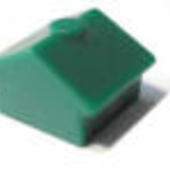Did you hear that sound today on Capitol Hill?
It was the sound of Congress flushing another $350 billion of tax payer money down the toilet.
The Senate approved Bush's request of Obama's request for the second tranche of $350 billion of TARP money to be made available for the Treasury's disposal.
And it appears as though the vote and approval could not have come at a better time for both Citigroup and Bank of America whose stock has been decimated in recent days. They will likely be the first banks to receive additional capital injections, Bank of America for the second time in three months and Citigroup for the third time in three months.
The problem I have with TARP is that it has become a "prop" from which the government will be unable to detach itself from anytime in the near future. It's kind of like a comedian that needs a bag of tricks in order to be funny, if you take away the bag of tricks you no longer have a comedian.
Well, in the absence of TARP, it appears that we longer have a banking system, the banks are going to lose billions of dollars on loan defaults because of a housing depression and economic recession all the while they are not making new loans so they don't have new revenue to support themselves, it's a really an ugly combination, kind of like a Yankee fan in Fenway Park in October, nothing good is going to happen and somebody may just get hurt. Admittedly, from what I have been reading, not only are banks reluctant to extend credit, but some consumers and businesses are also hesitant to take on new loans, the door swings both ways, neither of which is good.
Using TARP money to stabilzie the banking system in the absence of a true housing stimulus is a lot like taking a shower before you go to the gym in the morning, it just doesn't make any sense (There's another analogy that I wanted to use here, but common sense prevailed).
So rather than continuing to give banks billions of dollars so that they can digest their losses and stay afloat while every American around them is drowning, why not approach the banking system from another angle?
Why don't we stimulate demand for real estate by providing a tax incentive for Americans to invest in, well, America, and at the same time bring some price stability to the housing market? This would accomplish four things.
1.) If home prices stop falling, the banks are going to have fewer foreclosures. This is a fact. If the banks have fewer foreclosures, the banks are going to need less tax payer money to offset their losses.
2.) If we stimulate investment demand for real estate from people that have good credit and plenty of capital (something that a lot of first-time homebuyers don't have), the banks will in turn provide these people with loans. These loans will be a new source of revenue for banks, something they desperately need right now. Lending volume is down 55% from 2007.
3.) Americans will receive a tax benefit for investing in real estate and as a result they will have more disposable income, income they can then spend because they will be paying less in taxes.
4.) If home prices stop falling and banks stop needing to be resuscitated by TARP money, every American will be more confident and more likely to spend and invest.
The cost? Approximately $23 billion for an additional 1 million homes to be sold within the next year using an accelerated depreciation model. And considering the first $350 billion of TARP money had zero stimulative effect, it seems like this may be money well invested in the American people.


Comments (54)Subscribe to CommentsComment